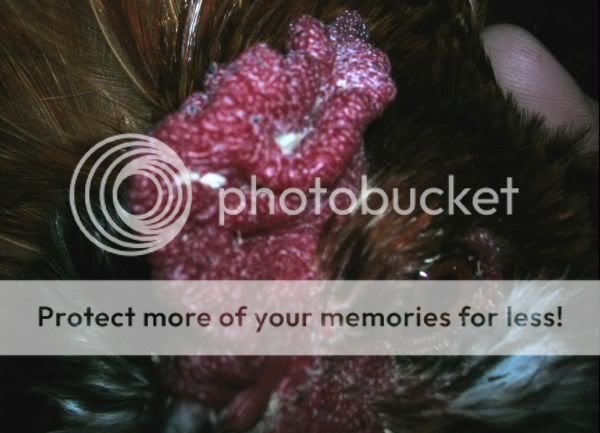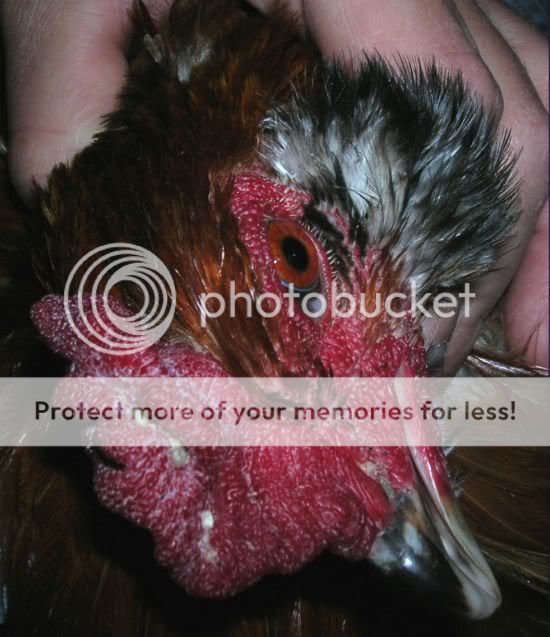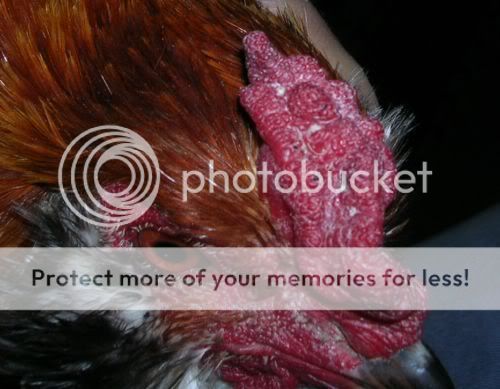Basic Facts
Riley and Little--large fowl Ameraucana hens. 1 1/2 yrs old. Smallish normally, and EXTREMELY underweight recently.
SunnyRiley and Littles father. 2 1/2 years. Normal size. Good weight.
Sunny and his mate (mother of Riley & Little) are from 1 breeder and are possibly full brother & sister.
These 3 chickens and 4 other large chickens were kept in 8 x 10 coop when problems started. Fenced run available to them for about 6 months--formerly used by dog. Pine shavings on pressboard wood coop floor, but bedding was probably 40-60% poop because not cleaned in a while. Bedding was kept dry. Run was dry dirt usually, with bits of coal, flaking lead paint, & glass sometimes.
Weather very hot. Coop had cross ventilation but still toasty at times. Chickens could use run but dominant chickens hogged the cool burrowing areas and Little & Riley often stayed inside the coop.
Had regular access to 18% lay crumbles in feeders most of the time. Scratch grains & 30 yr old wheat thrown in run most days too (about 35% of diet). Occasional handfuls of lawn grass and occasional fresh fruit.
Dewormed with pea-sized amount of moxidectin and praziquantel gel (typically for horses) in beak around March.
No injuries or signs of trauma.
Crop has never seemed stopped up.
There are no vets around that treat chickens.
--------------------------------------------------------------------------
Timeline
8 months ago:
I discovered a dead pigeon that apparently had been laying in the snow a couple days in the run, and removed it and all its feathers. It looked as though its body had been picked at either by chickens or a cat.
About that time, Sunny developed white, fuzzy-looking warts on his comb and still has them all the time to this day. A time or two I thought I saw a similar wart on another chickens comb, but couldnt clearly spot one. I guessed it was pigeon poxbut thats supposed to last only a month or two. Also, unlike the normal symptoms for that, he doesnt get a lot of dark scabs.
6 1/2 weeks ago:
I noticed Riley looking poor. She was molting & felt very skinny when I picked her up. She had diarrhea stuck on her feathers.
Her eyes, nose and breathing were clear.
Riley, Little & Sunny spent a lot of time in the coopmuch of it on perches rather than on floor near feeders.
She was not very interested in eating much of anything--lay crumbles, treats such as bread, etc. Except bugsshed light up when she saw bugs. So I started additionally taking her outside every night or 2 to catch earwigs, moths & beetles.
4 weeks ago:
I went in the coop in the evening & saw Little hunched on the floor beneath the nests. When I picked her up I discovered that though she was well-feathered, she was extremely emaciated and weak. She had diarrhea and so did another hen, but the other hen was pretty normal weight. I tried to help revive Little with sugar water, etc., but she passed less than half an hour later.
3 1/2 weeks ago:
I bathed all the remaining chickens and transferred them to a brand new huge coop with fresh shavings. It has a concrete floor and doesnt overheat as much. I started adding Vi-Tal (poultry vitamin, mineral & electrolyte powder), Aeromycin and apple cider vinegar to their water for 1 week. None of the chickens other than Riley built up diarrhea on their feathers again, although at least one chicken has periodically been doing bright green poops. The chickens are all an at-least-alright weight.
I separated Riley in a dog kennel with pine shavings I pick out regularly. Her poops were very bright green and she had lots of almost clear urates.
She seemed to perk up. She started growing feathers back in. I started sometimes having Rileys bug supplements be grasshoppers (which also gave her time to pick up grit if she wanted) instead of nighttime bugs.
3 weeks ago:
I tried putting Riley back with the others. She quickly showed it was too stressful and she was too weak. I separated her again. Along with lay crumbles & insects, I gave her such things as quick rolled oats, canola oil, high-acid tomatoes, various greens (such as zucchini, grass, green pepper, etc), peaches, applesauce, etc. Sprinkled Vi-Tal on her food sometimes. Let her eat straight fructose every day or 2pretty much however much she would. I cut out ACV in water, continued with Vi-Tal, and switched off Aeromycing and gave a sulphur-based med for 5 days. She seemed to perk up.
1 1/2 weeks ago:
Riley got weaker again and extremely thin. Not very interested in eating. Not as much energy for going after insects. I started giving her 1/4 baby aspirin every 2-4 days. I think it helps her feel better so she feels more like eating sometimes.
1 week ago:
Sprinkled some diamataceous earth on her lay crumbles but she seemed to not want to eat it so I dewormed her with pea-sized amount of moxidectin and praziquantel gel in her beak.
I started giving her plain yogurt with active cultures. Occasional grass along with treats. Realized she now hates having Vi-Tal sprinkled on food, though seems to be alright with it in water. Cut Vi-Tal out entirely. Rileys poops got darker green.
Saturday:
Started giving 3 drops of Poly-Visol without Iron twice a day. Added generous 2 pinchfuls of [Himalayan?? some high-mineral salt] to her 1 mug of drinking water along with ACV. I put a container of grit in her kennel where she could access it. I started mixing in 22% Manna Pro Gamebird/Showbird Conditioner mini-pellets half and half with her lay crumbles. I put a very small handful of scratch on her floor.
Sunday:
Her poops got much more firm looking and darker in center, with watery urates.
Riley ate poorly Sat night but well Sun morning. I left for trip that evening.
Today (Tuesday):
I just got back. The person taking care of Riley told me she ate well Sun night & Mon morning, but was very weak last night. The caretaker was able to give her some sweetened yam syrup & Poly-Visol.
Riley was astonishingly weak when I got home 2 hours agolying partly on her side. Lots of runny diarrhea on her.
I mixed up fructose and Vi-Tal in water. Gradually gave her 1.5 cc.
Gave her .3 cc of canola oil.
Have her wrapped in a towel on by lap, and have been giving her a few drops of fructose water every 10 mins. She is gradually regaining enough energy to resist dropper feeding.
-------------------------------------------------------------------
Help! Help! Help! Help! Help! Help! Help!
Brainstorms on what could be the overall cause of Riley's problem???
I don't know if it might be tied to Sunny's.
I think maybe Riley's recent turn for the worse could have to do with the stress of deworming and/or overdose of minerals??
Thank you SO much if you can help!!! I dont want to lose this wonderful little hen! She is such a sweetheart and pet she will fly up and perch on my arm if I invite her. Little was also a sweetie...
Riley and Little--large fowl Ameraucana hens. 1 1/2 yrs old. Smallish normally, and EXTREMELY underweight recently.
SunnyRiley and Littles father. 2 1/2 years. Normal size. Good weight.
Sunny and his mate (mother of Riley & Little) are from 1 breeder and are possibly full brother & sister.
These 3 chickens and 4 other large chickens were kept in 8 x 10 coop when problems started. Fenced run available to them for about 6 months--formerly used by dog. Pine shavings on pressboard wood coop floor, but bedding was probably 40-60% poop because not cleaned in a while. Bedding was kept dry. Run was dry dirt usually, with bits of coal, flaking lead paint, & glass sometimes.
Weather very hot. Coop had cross ventilation but still toasty at times. Chickens could use run but dominant chickens hogged the cool burrowing areas and Little & Riley often stayed inside the coop.
Had regular access to 18% lay crumbles in feeders most of the time. Scratch grains & 30 yr old wheat thrown in run most days too (about 35% of diet). Occasional handfuls of lawn grass and occasional fresh fruit.
Dewormed with pea-sized amount of moxidectin and praziquantel gel (typically for horses) in beak around March.
No injuries or signs of trauma.
Crop has never seemed stopped up.
There are no vets around that treat chickens.
--------------------------------------------------------------------------
Timeline
8 months ago:
I discovered a dead pigeon that apparently had been laying in the snow a couple days in the run, and removed it and all its feathers. It looked as though its body had been picked at either by chickens or a cat.
About that time, Sunny developed white, fuzzy-looking warts on his comb and still has them all the time to this day. A time or two I thought I saw a similar wart on another chickens comb, but couldnt clearly spot one. I guessed it was pigeon poxbut thats supposed to last only a month or two. Also, unlike the normal symptoms for that, he doesnt get a lot of dark scabs.
6 1/2 weeks ago:
I noticed Riley looking poor. She was molting & felt very skinny when I picked her up. She had diarrhea stuck on her feathers.
Her eyes, nose and breathing were clear.
Riley, Little & Sunny spent a lot of time in the coopmuch of it on perches rather than on floor near feeders.
She was not very interested in eating much of anything--lay crumbles, treats such as bread, etc. Except bugsshed light up when she saw bugs. So I started additionally taking her outside every night or 2 to catch earwigs, moths & beetles.
4 weeks ago:
I went in the coop in the evening & saw Little hunched on the floor beneath the nests. When I picked her up I discovered that though she was well-feathered, she was extremely emaciated and weak. She had diarrhea and so did another hen, but the other hen was pretty normal weight. I tried to help revive Little with sugar water, etc., but she passed less than half an hour later.
3 1/2 weeks ago:
I bathed all the remaining chickens and transferred them to a brand new huge coop with fresh shavings. It has a concrete floor and doesnt overheat as much. I started adding Vi-Tal (poultry vitamin, mineral & electrolyte powder), Aeromycin and apple cider vinegar to their water for 1 week. None of the chickens other than Riley built up diarrhea on their feathers again, although at least one chicken has periodically been doing bright green poops. The chickens are all an at-least-alright weight.
I separated Riley in a dog kennel with pine shavings I pick out regularly. Her poops were very bright green and she had lots of almost clear urates.
She seemed to perk up. She started growing feathers back in. I started sometimes having Rileys bug supplements be grasshoppers (which also gave her time to pick up grit if she wanted) instead of nighttime bugs.
3 weeks ago:
I tried putting Riley back with the others. She quickly showed it was too stressful and she was too weak. I separated her again. Along with lay crumbles & insects, I gave her such things as quick rolled oats, canola oil, high-acid tomatoes, various greens (such as zucchini, grass, green pepper, etc), peaches, applesauce, etc. Sprinkled Vi-Tal on her food sometimes. Let her eat straight fructose every day or 2pretty much however much she would. I cut out ACV in water, continued with Vi-Tal, and switched off Aeromycing and gave a sulphur-based med for 5 days. She seemed to perk up.
1 1/2 weeks ago:
Riley got weaker again and extremely thin. Not very interested in eating. Not as much energy for going after insects. I started giving her 1/4 baby aspirin every 2-4 days. I think it helps her feel better so she feels more like eating sometimes.
1 week ago:
Sprinkled some diamataceous earth on her lay crumbles but she seemed to not want to eat it so I dewormed her with pea-sized amount of moxidectin and praziquantel gel in her beak.
I started giving her plain yogurt with active cultures. Occasional grass along with treats. Realized she now hates having Vi-Tal sprinkled on food, though seems to be alright with it in water. Cut Vi-Tal out entirely. Rileys poops got darker green.
Saturday:
Started giving 3 drops of Poly-Visol without Iron twice a day. Added generous 2 pinchfuls of [Himalayan?? some high-mineral salt] to her 1 mug of drinking water along with ACV. I put a container of grit in her kennel where she could access it. I started mixing in 22% Manna Pro Gamebird/Showbird Conditioner mini-pellets half and half with her lay crumbles. I put a very small handful of scratch on her floor.
Sunday:
Her poops got much more firm looking and darker in center, with watery urates.
Riley ate poorly Sat night but well Sun morning. I left for trip that evening.
Today (Tuesday):
I just got back. The person taking care of Riley told me she ate well Sun night & Mon morning, but was very weak last night. The caretaker was able to give her some sweetened yam syrup & Poly-Visol.
Riley was astonishingly weak when I got home 2 hours agolying partly on her side. Lots of runny diarrhea on her.
I mixed up fructose and Vi-Tal in water. Gradually gave her 1.5 cc.
Gave her .3 cc of canola oil.
Have her wrapped in a towel on by lap, and have been giving her a few drops of fructose water every 10 mins. She is gradually regaining enough energy to resist dropper feeding.
-------------------------------------------------------------------
Help! Help! Help! Help! Help! Help! Help!
Brainstorms on what could be the overall cause of Riley's problem???
I don't know if it might be tied to Sunny's.
I think maybe Riley's recent turn for the worse could have to do with the stress of deworming and/or overdose of minerals??
Thank you SO much if you can help!!! I dont want to lose this wonderful little hen! She is such a sweetheart and pet she will fly up and perch on my arm if I invite her. Little was also a sweetie...
Last edited:








